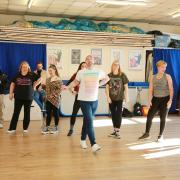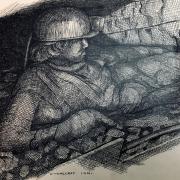We delve into the day-to-day life of sheep farmer Olivia Woodward as she looks after her hardy Herdwick flock in Crowton.

05:30
MORNING ROUNDS
I live on a farm, so my first job is to check on the sheep that I keep in the fields here while having a quick breakfast on the go. I scan around to make sure there is nothing obviously wrong with them and that the fencing is all intact. I'll look out for whether they are happily standing on all four legs as an indicator of their overall health. I keep the animals at a few different fields, so I make sure I visit each location once a day. I keep a flock at home in Crowton, one in a field down the road and some more sheep on my boyfriend's parents' land in Tarporley - it's a family affair!

09:00
OTHER RESPONSIBILITIES
I get up early because, although people find it strange, I'm also a dentist so sometimes at this time I go to the surgery to work. Most sheep farmers have another job too to make it financially feasible, but my employers are really flexible so I do some full days, some half and some full with the sheep. If I'm at work my mum helps me out with checks and she'll send me photos and videos of them too! I started working with the sheep five years ago as a hobby, and never thought I'd be breeding them as I am now. My friend suggested the Herdwick breed as they are hardy and good mothers, so I started with six ewes and borrowed a male ram for lambing.
I now have 60 sheep.
11:00
FARM WORK
I keep three horses as well, so if I'm not with the sheep I'm mucking out or riding. If I'm out on the horse, I'll ride past the sheep fields again to keep an eye on them and kill two birds with one stone. I've always been outdoorsy and loved animals, so I don't mind being busy.
12:00
OBSERVATIONS
Lunchtime is when I'll go out and do thorough checks of all the flock, particularly looking out for them being lame as sheep are very prone to this. At this time of year when the ground is very wet, they get Scald, which causes inflammation of the skin in their feet and stops them grazing. I'll give those who need it antibiotics or trim their feet and take their temperature if I'm worried. I'll also look out for signs of pneumonia, although this can be tricky as sheep don't show they're ill until it's too late. I like to hand feed them every day because I know that if they're coming up for their corn buckets, they're doing okay. A lot of the job is about observing and watching how they interact with each other. In tupping season, I'll spend this time putting raddle, a coloured paint, on the ram's chests so I can monitor when they are mating with the ewes.
14:00
MAINTENANCE
Looking after the fields takes time, so in the afternoon I'll be trimming the hedges and mending fences. My boyfriend helps me with this and the fertilising of the fields. I quite like it when I have help as a lot of the time, I'm on my own. Having the farming community around me has been great too, especially because I have been teaching myself. Cheshire used to be a big dairy county, but now a lot of people keep sheep instead so the local farmers helped me out to start with. The vets and horticultural stores have been brilliant. If I was ever unsure of anything, I could give them a call.
16:00
MOVING AROUND
Sometimes I need to move the sheep around the different fields, and this can take a few hours until the end of my day. I'll pack them up in the trailer and drive them to where they need to be. They have hay on an evening, so I'll make sure these are topped up.
20:00
TIME TO LEARN
I'll often spend my evenings reading books about lambing or looking at courses I could take. It's important to know when things are going wrong so I need to know about all the illnesses and diseases. In my first lambing season, I had a problem with Twin Lamb Disease where the ewes become poorly because of the energy demands the foetuses place on them. I've had to take experiences like this as learning curves. I want to get to a point when I'm breeding sheep that I can take to the annual sale in Cockermouth and be recognised as a breeder - I'd love to do this full time.



























